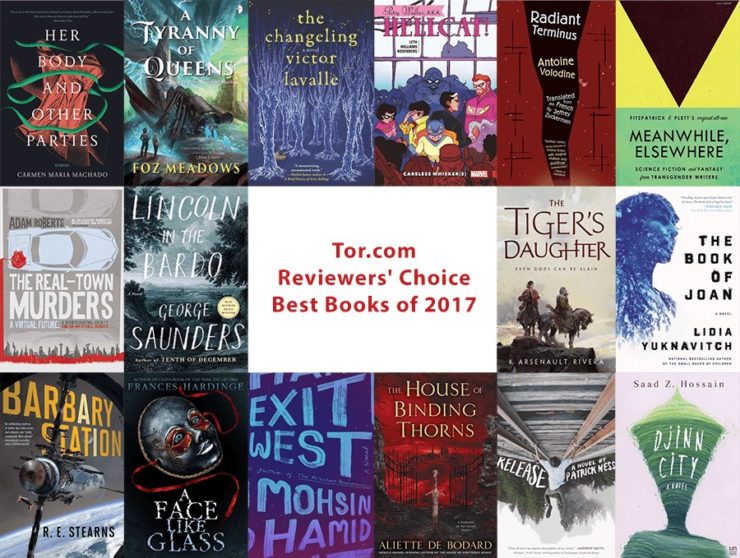“Pretty much the only thing keeping me going is fiction,” our reviewer Alex Brown says, below. That could sound despairing—but there’s so much good fiction in this year’s crop that maybe you can read it as a celebration as well. We loved the ends and the beginnings of series; we loved debuts and new work from established writers; we loved eerie stories, translations, award-winners, sequels, and everything in between. If you’re looking for a story to keep you company as the nights get longer and the year draws to a close, may we suggest some of the following?
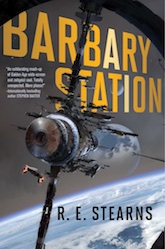 My perennial complaint about making a choice of favourite books is limiting myself to that handful. Staying within bounds and not letting my utter joy at all the books I’ve loved this year overflow the cup…
My perennial complaint about making a choice of favourite books is limiting myself to that handful. Staying within bounds and not letting my utter joy at all the books I’ve loved this year overflow the cup…
…am I mixing my metaphors? If I have to choose one book from this year to recommend that everyone read, it’s Aliette de Bodard’s beautiful, striking, gothic and intense The House of Binding Thorns, sequel—of sorts—to The House of Shattered Wings, and set in a decaying Paris in the aftermath of a destructive magical war. Fallen angels, dragon kingdoms under the Seine, immigrant communities, families both made and born: the chains you accept and the ones you refuse.
Similar in theme but also vastly different is Foz Meadows’ portal fantasy The Tyranny of Queens, sequel to An Accident of Stars. I’m an evangelist for this book—for both of them, actually—so let me tell you that these books are books that speak to my heart, that are portal fantasy with consequences, with queerness, with a deep interest in consent and autonomy, with found family, with history and who gets to tell the story, and with dragons. (Really cool dragons.)
There are a lot of really good books around this year, and I loved a great number of them. (See my column and my reviews for details.) But I think the last one that I will directly commend to your attention is R.E. Stearns’ debut novel, Barbary Station. A novel of engineers, pirates, and murderous AI in the outer reaches of the solar system, it’s enormously appealing. For me, part of its appeal is the strong, well-established, mutually loving and respectful relationship between its two protagonists—who’re both women of colour. It is excellent, and stands alone in one volume. But there’ll be a sequel, and I cannot express how happy I am to know that there’ll be more.
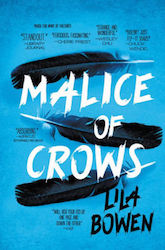 2017 has been a hellacious year, and pretty much the only thing keeping me going is fiction. Whether it be television, movies, comics, or books, escapism is the only reason I’m not currently on a rooftop screaming. Luckily, a lot of great SFF released this year, so I had plenty of reality avoidance to choose from. Comics-wise, Redlands and Crosswind are fire and ice and everything nice. They’re powerful stories about people in uncontrollable situations, and both crackle with creative verve. Filling out my Top 5 are Misfit City, Scales and Scoundrels, and Moonstruck, three delightful, dreamy series that haven’t gotten nearly enough love.
2017 has been a hellacious year, and pretty much the only thing keeping me going is fiction. Whether it be television, movies, comics, or books, escapism is the only reason I’m not currently on a rooftop screaming. Luckily, a lot of great SFF released this year, so I had plenty of reality avoidance to choose from. Comics-wise, Redlands and Crosswind are fire and ice and everything nice. They’re powerful stories about people in uncontrollable situations, and both crackle with creative verve. Filling out my Top 5 are Misfit City, Scales and Scoundrels, and Moonstruck, three delightful, dreamy series that haven’t gotten nearly enough love.
For YA, it’s a four-way tie between Lila Bowen’s Malice of Crows, Heidi Heilig’s Ship Beyond Time, V. E. Schwab’s Our Dark Duet, and Mackenzi Lee’s Gentleman’s Guide to Vice and Virtue. A quartet of astoundingly good (and über intersectionally diverse!) YA fantasy that push their characters beyond stale tropes.
Although I didn’t read much in the way of non-YA or non-comics, there were a few adult fiction books that pulled me in. My favorite novella was Margaret Killjoy’s The Lamb Will Slaughter the Lion—a prickly little tale full of heart and blood. Most beloved short story collection has to be Meanwhile, Elsewhere: Science Fiction and Fantasy from Transgender Writers, one of those rare collections that doesn’t have a dud in the bunch—excellent from top to bottom. But my absolute favorite adult SFF book was Chuck Wendig’s Thunderbird. Miriam Black is back and just as vicious and headstrong as ever. The story sizzles with pain and poor choices.
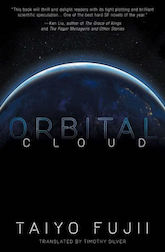 Another year, another batch of outstanding speculative fiction in translation (SFT). With 50 (so far) novels/collections and nearly 60 short stories (that I even know of!), there’s plenty of science fiction, fantasy, horror, magical realism, Weird, and more to keep you occupied for the next several years. It’s hard to pick just a few of my favorites, but here I go:
Another year, another batch of outstanding speculative fiction in translation (SFT). With 50 (so far) novels/collections and nearly 60 short stories (that I even know of!), there’s plenty of science fiction, fantasy, horror, magical realism, Weird, and more to keep you occupied for the next several years. It’s hard to pick just a few of my favorites, but here I go:
Ok I’m going to cheat here and mention two titles in one paragraph: Radiant Terminus and The Invented Part, both from Open Letter Books. While this press doesn’t focus on speculative fiction, it does publish some of the most innovative and exciting texts from around the world. Neither of these two titles easily fits into any genre or subgenre, but they both push the boundaries of perceived “reality” and take on such themes as death, the dream state, self-awareness, destiny, memory, and “narrative” itself. Radiant Terminus (by Antoine Volodine, translated from the French by Jeffrey Zuckerman) is both a paean to the unquenchable human spirit and a horrific nightmare about a degrading and depressing immortality (brought on by a chain of nuclear disasters). The Invented Part (by Rodrigo Fresan, translated from the Spanish by Will Vanderhyden) is in one way the story of a writer who seeks to merge with the God particle at CERN and become The Writer In Charge Of The Narrative of Reality, but in other ways it’s a meditation on *how* we tell stories, how aging changes our perceptions, what F. Scott Fitzgerald’s life and work can teach us, and much more. Cheers to Open Letter for bringing us some of the best SFT this year.
Next up is the Argentine novel Bodies of Summer by Martin Felipe Castagnet, translated from the Spanish by Frances Riddle, from Dalkey Archive Press. What if, when we die, our consciousness is uploaded to the internet, and (for a price) can be downloaded back into another body in a strange kind of reincarnation? This question lies at the heart of Bodies and fuels its difficult but important questions about the nature of consciousness, morality, law, religion, and technology now and far into the future.
My last pick is Orbital Cloud by Taiyo Fujii, translated from the Japanese by Timothy Silver, from Haikasoru. Here we have space tethers, lone Iranian scientists, Japanese tech wizards, NORAD, the CIA, and more. Fujii thus gives us 500-plus pages of complex calculations and brilliant technological counterterrorism strategies. And just as in Gene Mapper (2015), Fujii’s previous novel translated into English, advanced technology mixed with a mystery with global implications makes for a brilliant piece of speculative fiction. This novel asks us to think broadly about who controls what gets put into orbit and what that tells us about individual nations’ strategies for dominating the space industry and future space exploration.
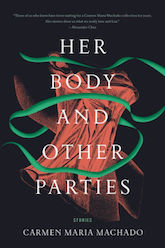 Three books for 2017? Here we go. First, Carmen Maria Machado’s Her Body and Other Parties, which taps beautifully into the way that irrationality can be used to create a sense of utterly undeniable horror. Alternately, it contains a number of stories in which bizarre, shocking things happen to characters, from strange plagues to folktales turned wrenchingly tactile–but while the rules governing these things might seem alien to us, they’re clearly present. Also, there’s an extended riff on Law & Order: SVU that’s mesmerizing, moving, and ultimately transcendental.
Three books for 2017? Here we go. First, Carmen Maria Machado’s Her Body and Other Parties, which taps beautifully into the way that irrationality can be used to create a sense of utterly undeniable horror. Alternately, it contains a number of stories in which bizarre, shocking things happen to characters, from strange plagues to folktales turned wrenchingly tactile–but while the rules governing these things might seem alien to us, they’re clearly present. Also, there’s an extended riff on Law & Order: SVU that’s mesmerizing, moving, and ultimately transcendental.
Mohsin Hamid’s Exit West is, for my mind, a pitch-perfect way to tell a story using magical realism: nearly everything about it feels torn from the headlines of the last few decades, right up until he gets to the point where doors act as portals to different parts of the world. But there’s also a magnificent use of specificity and generality in these pages; Hamid takes a bunch of compositional risks that end up paying off in a tremendous way. And Jac Jemc’s The Grip of It features a whole bunch of things I dig in a narrative: haunted houses, ambiguous ghosts, spaces that don’t quite make sense, (possibly) unreliable narrators, and sinister neighbors. Jemc is fantastic at sustaining narrative ambiguity, and the result is a book that seems to be haunted itself.
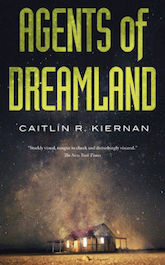 Death cults, fungus, and the vast, time-hopping conspiracies of eldritch horrors, oh my. Caitlìn R. Kiernan’s Agents of Dreamland had everything I love crammed into a deceptively slim novella. Kiernan, one of the sharpest voices in weird fiction, has created a bleak and beautiful playground and her new edition of her first Signalman novella, Black Helicopters, is one I’m hoping to see in 2018. I can never get enough nightmare fuel. I also really loved Kristi DeMeester’s creepy debut novel Beneath, which centers on a journalist fighting against a fundamentalist sect, abuse, and terrifying ancient gods. I read a lot for review and for work, so I made a point of tackling some new classics this year, for a sanity break.
Death cults, fungus, and the vast, time-hopping conspiracies of eldritch horrors, oh my. Caitlìn R. Kiernan’s Agents of Dreamland had everything I love crammed into a deceptively slim novella. Kiernan, one of the sharpest voices in weird fiction, has created a bleak and beautiful playground and her new edition of her first Signalman novella, Black Helicopters, is one I’m hoping to see in 2018. I can never get enough nightmare fuel. I also really loved Kristi DeMeester’s creepy debut novel Beneath, which centers on a journalist fighting against a fundamentalist sect, abuse, and terrifying ancient gods. I read a lot for review and for work, so I made a point of tackling some new classics this year, for a sanity break.
Apparently I was really, really into cults in 2017 because I also read Katherine Dunn’s 1989 novel Geek Love for the first time and cannot get the terrible, tragic Binewski family out of my depressingly norm head.
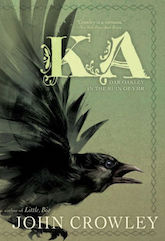 I had the impression that Adam Roberts’s The Real-Town Murders was to be a detective story of sorts, about an impossible crime in a possible future. Roberts plays with genre as much as ever, but what begins like a locked-room mystery quickly reveals itself as, amongst other things, a book-length homage to the films of Alfred Hitchcock. Roberts has shot through with dozens of references to the Master of Suspense’s films made and unmade. Most of these allusions are incidental, so it’s perfectly accessible if you’re by some sad chance unfamiliar with Hitchcock.
I had the impression that Adam Roberts’s The Real-Town Murders was to be a detective story of sorts, about an impossible crime in a possible future. Roberts plays with genre as much as ever, but what begins like a locked-room mystery quickly reveals itself as, amongst other things, a book-length homage to the films of Alfred Hitchcock. Roberts has shot through with dozens of references to the Master of Suspense’s films made and unmade. Most of these allusions are incidental, so it’s perfectly accessible if you’re by some sad chance unfamiliar with Hitchcock.
There’s a lot of good reading time left in this year, with several just-published books I want to read: Mark Frost’s Twin Peaks: The Final Dossier is the coda to one of this decade’s most astonishing pieces of art. John Crowley’s Ka: Dar Oakley in the Ruin of Ymr is his first fantasy in over a decade. I don’t read too many animal fantasies, but I will make an exception for Crowley. Occasional misanthrope that I am, I’m looking forward to diving into the casual treachery and wry cynicism of K.J. Parker’s three-volume The Two of Swords.
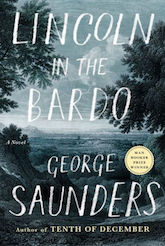 I read many many words this year, but unsurprisingly the ones that resonated most with me were the stories that grappled with the tensions over race, gender, and politics that we may always have with us, but which have seemed particularly incendiary this year. First up, I’m cheating a little, because I wan to mention Lincoln in the Bardo by George Saunders even though I’ve also included it in my list of “Things that Sparked Joy in 2017.” That’s how much I love it. The deceptively simple plot follows Abraham Lincoln and a host of ghosts over the course of a single night—the night after the death of young Willie Lincoln. While the President reckons with his grief and the horror of the Civil War, the ghosts work to free Willie’s soul from potentially being trapped in the “Bardo” a shadowy limbo loosely based on Buddhist teachings. The book, Saunders’ first novel, is hilarious, gross, mournful, hopeful, and just might make you a better person for reading it.
I read many many words this year, but unsurprisingly the ones that resonated most with me were the stories that grappled with the tensions over race, gender, and politics that we may always have with us, but which have seemed particularly incendiary this year. First up, I’m cheating a little, because I wan to mention Lincoln in the Bardo by George Saunders even though I’ve also included it in my list of “Things that Sparked Joy in 2017.” That’s how much I love it. The deceptively simple plot follows Abraham Lincoln and a host of ghosts over the course of a single night—the night after the death of young Willie Lincoln. While the President reckons with his grief and the horror of the Civil War, the ghosts work to free Willie’s soul from potentially being trapped in the “Bardo” a shadowy limbo loosely based on Buddhist teachings. The book, Saunders’ first novel, is hilarious, gross, mournful, hopeful, and just might make you a better person for reading it.
Next up is a story that is equal parts dark fairy tale, body horror, and racial commentary: The Changeling by Victor LaValle. LaValle is one of our great interrogators of horror tropes, and in this book he imagines the, ah, complications that would ensure of a Black man and woman were put through the paces of a Nordic fairy tale. Apollo and Emma Kagwe are just embarking on the joys and struggles of brand-new parenthood when Emma begins to suspect that there’s something…wrong…with their baby. What follows is a terrifying journey through an unseen New York, as the two fight to save their child and their love.
Finally, The Book of Joan, by Lidia Yuknavitch, took up residence in my brain back in March and has never fully moved out. Dealing with environmental disaster, religious corruption, and the horrifying reign of a reality-TV-shyster-turned-world-leader, this may be the most “important” book of the year—but luckily for us Yuknavitch never coasts on importance. This, her first foray into science fiction, does some impressive worldbuilding and future forecasting, but never loses sight of the central story of Christine Pizan, who etches stories into skin, and her love for Joan of Dirt, who might just save her world. Yuknavitch’s writing is so gritty, sensual, and alive that by the end, I began to believe that it just might save our world.
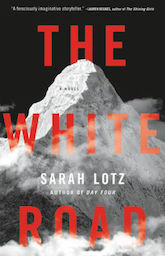 Here’s how to cram six books into a three book list? Cram them into awkward pairs! I’m like the discount online dating of Reviewers’ Choice!
Here’s how to cram six books into a three book list? Cram them into awkward pairs! I’m like the discount online dating of Reviewers’ Choice!
For pure entertainment, Benjamin Percy’s The Dark Net is a glorious horror throwback and Sarah Lotz’s The White Road is a thoroughly disconcerting thriller. Both fuse technology and the supernatural in ways that make the reader take a second look at the world around them. Also: gooey, horrible deaths.
Deji Olukotun’s After the Flare and Saad Hossain’s Djinn City are both successful follow-ups to incredible debuts. Both books are daring, fun and (excitingly) contemporary—disproving the myth of the “difficult second novel.”
Release is another work of perfection from Patrick Ness. A young man wrestles with his family’s disapproval and the end of his first love. Simultaneously, a fairy queen searches for solace. Both stories are about identity and acceptance, and both are, in typically Nessian fashion heartbreaking and beautiful. Meanwhile, Patsy Walker AKA Hellcat! (Kate Leth and Brittney Williams) is, in the age of sweet, thoughtful comic books, the most sweet and thoughtful yet. A comic about friendship and fitting in, Hellcat packs a sly emotional punch beneath its warm humour. Both are linked because I can’t get either out of my head: they’re books that keep growing, long after you’ve finished them—a sign of rare brilliance.
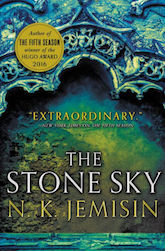 Pulling off the end of a series like the Broken Earth is no easy feat. N.K. Jemisin’s The Stone Sky is everything I could’ve asked for—a page-turner with real change and real consequences, hard lessons and inevitable truths. The only bad part is the thought of not going back to this universe, but then again, that’s what re-reading is for, and Jemisin’s books are absolutely rewarding upon return visit.
Pulling off the end of a series like the Broken Earth is no easy feat. N.K. Jemisin’s The Stone Sky is everything I could’ve asked for—a page-turner with real change and real consequences, hard lessons and inevitable truths. The only bad part is the thought of not going back to this universe, but then again, that’s what re-reading is for, and Jemisin’s books are absolutely rewarding upon return visit.
I’ve already said enough about Frances Hardinge and her two 2017 books, A Face Like Glass and A Skinful of Shadows, but hers weren’t the only excellent YA books I read this year: I’m still anxiously awaiting the sequel to Rin Chupeco’s dark, detailed, affecting The Bone Witch, and I’m still thinking about Kristin Cashore’s Jane, Unlimited. Jane is an odd book, and one I find nearly impossible to describe without spoiling. It’s several books in one; its protagonist sometimes seems too malleable, but that’s also kind of the point; it has the best dog I’ve met in a book in ages; it hit too close to home with some of the ways it represents and explores grief and loss, and relief from those feelings. Cashore’s structural ambition almost masks the book’s punch, but then the end comes, and it’s perfect.
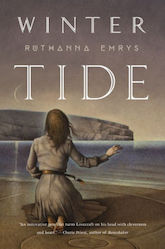 The Tiger’s Daughter, by K Arsenault Rivera. Poetic, complex, beautiful, and ultimately a love story in a fascinating fantasy world far beyond the Great Wall of Europe. Plus magic, demons, swordplay, and everything one could want in a fantasy novel. A stunning debut that reminded me of the power of the genre.
The Tiger’s Daughter, by K Arsenault Rivera. Poetic, complex, beautiful, and ultimately a love story in a fascinating fantasy world far beyond the Great Wall of Europe. Plus magic, demons, swordplay, and everything one could want in a fantasy novel. A stunning debut that reminded me of the power of the genre.
Winter Tide, Ruthanna Emrys. A novel that extends and broadens the possibilities of Neo-Lovecratian fiction. A cozy, domestic, and yet potent story of acceptance, destiny, persecution, intolerance, racism, and other deep topics. Plus Deep Ones.
Blackthorne by Stina Leicht. Even more potent than its predecessor, Blackthorne extends and broadens the story of Leicht’s fascinating secondary world. A story of conflict, surviving disaster and catastrophe, dark magic, scheming people in bad situations, and a broad epic fantasy canvas to set it all on. Wonderful characters in an intriguing world.










